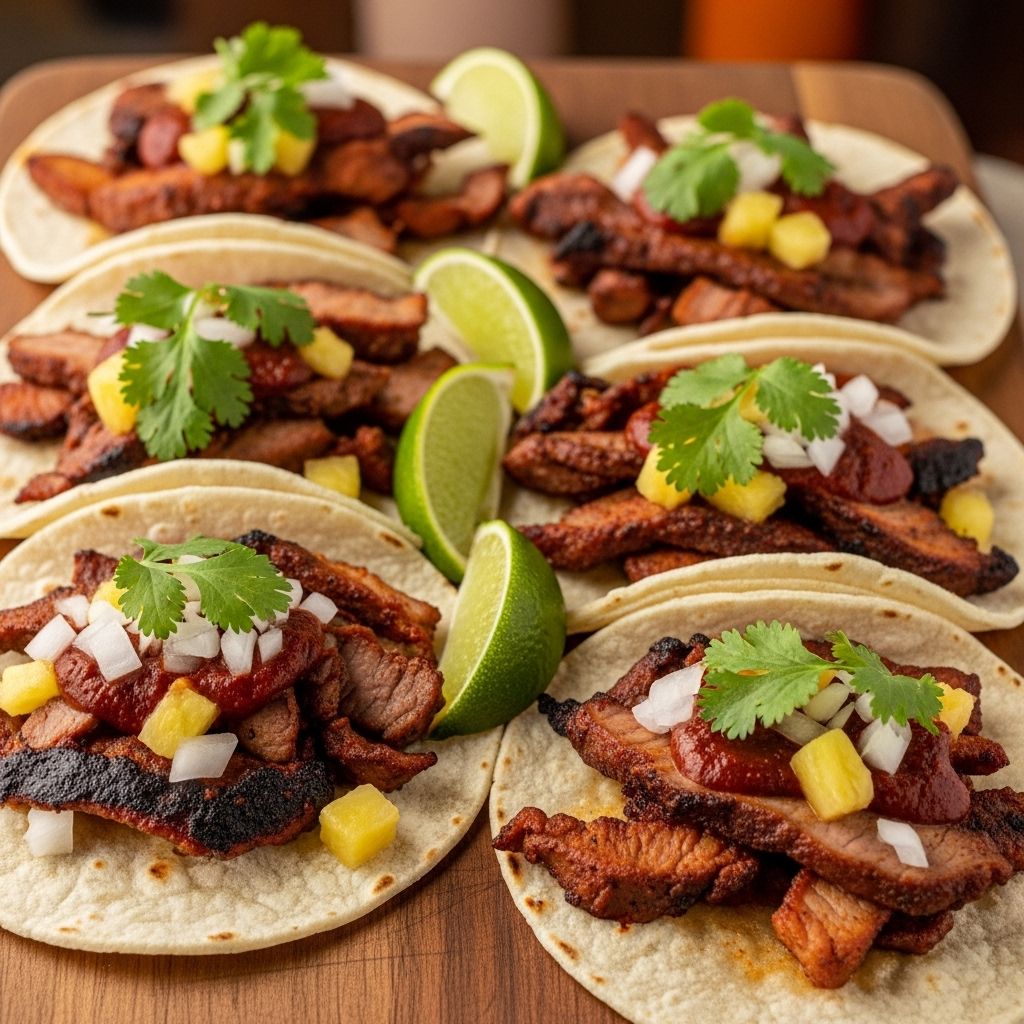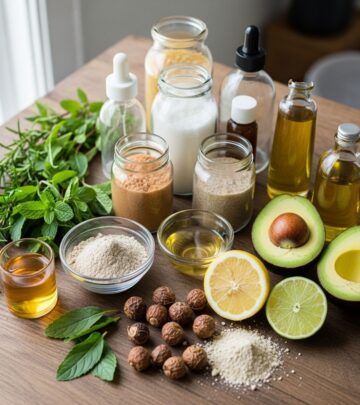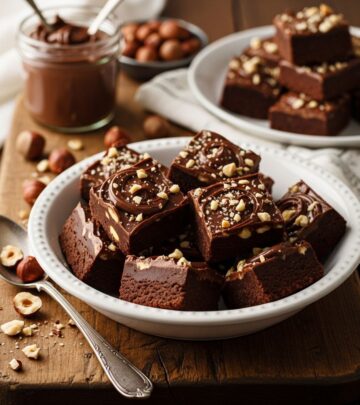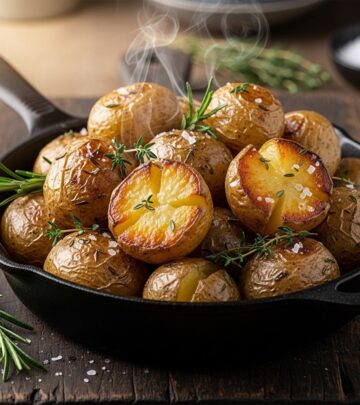Al Pastor 101: Origins, Technique, and Flavorful Tacos Explained
Discover sweet pineapple, smoky spice, and crisp pork edges in every homemade taco.

Al Pastor 101: Mexico’s Shepherd-Style Pork Taco
Taco lovers worldwide commonly rank Al Pastor among the best expressions of Mexican street food. With its unforgettable blend of sweet, spicy, and smoky flavors, Al Pastor is a taco you’ll crave again and again. This article explores its origins, signature cooking methods, choice of ingredients, and how to make a delicious version in your own kitchen.
What is Al Pastor?
Al Pastor is a Mexican pork preparation that’s renowned for its complex flavors. The pork is traditionally marinated in dried chiles, spices, achiote, and pineapple, then cooked on a vertical spit (“trompo“)—a technique inherited from Lebanese immigrants.
- Sweet, tart pineapple is layered with rich pork.
- Spicy and smoky marinade uses chiles and achiote.
- Served on tortillas with chopped onions, cilantro, and pineapple.
When ordering at a taquería, if Al Pastor is on the menu, it’s a must-try—the dish delivers a balanced marriage of tropical sweetness and fiery heat in every bite.
Why Is It Called “Al Pastor”?
Al Pastor’s roots explain its name—and much of its unique character:
- Central Mexican tradition: The dish was developed in Mexico’s heartland, but its culinary origin has a surprising twist.
- Lebanese influence: In the early 1900s, Lebanese immigrants brought the method of vertical spit roasting—originally used for shawarma—to Mexico.
- “Shepherd Style”: Mexican shepherds adapted the vertical spit, using marinated pork instead of lamb (the Lebanese staple), thus creating “Al Pastor,” which literally means “shepherd style.”
This blend of Middle Eastern cooking technique and Mexican flavors epitomizes culinary fusion at its best.
What Cut of Pork Is Best?
The success of Al Pastor relies heavily on your choice of pork:
- Pork shoulder: The classic and preferred cut, thanks to its balance of fat and tenderness.
- Pork sirloin or pork loin: Acceptable alternatives, but much leaner—these can dry out easily and produce less juicy results.
While true Al Pastor is sliced and stacked onto a spit, home cooks can find success with pork shoulder in a slow cooker, oven, or skillet.
Traditional Al Pastor Technique and Modern Adaptation
Authenticity matters to purists, but most home kitchens lack a vertical spit. Fortunately, there are ways to approach this classic without professional equipment:
- Traditional method: Thin slices of marinated pork are stacked on a “trompo,” topped with pineapple, and slowly rotated next to a flame. The result: chars and caramelization on the outside, juicy meat within.
- Modern home method: Marinate pork, then cook in a slow cooker, oven, or skillet until tender. Char pineapple rings for garnish and flavor. Crisp shredded pork in a skillet to mimic the trompo’s signature caramelized edges.
Full disclaimer: Most home recipes are not truly authentic—but they come delightfully close to the original in flavor.
Step-By-Step: Making Al Pastor at Home
Ready to upgrade your Taco Tuesday? Here’s a basic approach that mirrors Mexico’s best-loved technique within a home kitchen:
- Preparation:
- Marinate pork shoulder with dried chiles, achiote, pineapple juice, and spices such as cumin, oregano, and black pepper.
- Let it rest: Marinate for several hours, preferably overnight for maximum flavor absorption.
- Cooking:
- Cook pork in a slow cooker until fork-tender, or roast in the oven. The goal is juicy meat ready to be shredded.
- Char pineapple rings on a skillet until golden and caramelized.
- Crisp shredded pork in batches on a skillet to achieve the “trompo” effect.
- Serving:
- Warm corn (or flour) tortillas over an open flame or hot skillet.
- Fill tortillas with crispy pork, chopped caramelized pineapple, pickled onions, cilantro, and fresh lime.
Sample Al Pastor Marinade Ingredients (Adapted for Home Cooking)
| Ingredient | Purpose |
|---|---|
| Dried chiles (guajillo, ancho) | Smoky heat & color |
| Achiote paste | Earthy flavor & red color |
| Pineapple juice | Tropical sweetness, tenderizer |
| Garlic & onion | Pungency & depth |
| Spices (cumin, oregano, black pepper) | Warmth & complexity |
| Vinegar | Balancing acidity |
How Al Pastor is Typically Served
- Tortillas: Small, warm corn tortillas are preferred for authentic tacos, but flour tortillas work.
- Onions: Adds crunch and sharpness.
- Chopped cilantro: Bright, herbal notes.
- Fresh pineapple pieces: Echoes the marinade’s sweetness and caramelization.
- Lime wedges: To squeeze over the top before eating, awakening all flavors.
- Pickled red onions (optional): A tangy condiment for added zest.
Why Is Al Pastor So Beloved?
Al Pastor’s popularity spans continents, and for good reason:
- Multi-layered flavor: The combination of spices, chiles, fruit, and fire creates a deeply satisfying taco.
- Street food origins: Its accessibility makes it a daily staple and a celebratory treat alike.
- Cultural fusion: Few recipes embody culinary migration and evolution like Al Pastor, which bridges Middle Eastern technique and Mexican tradition.
- Visual appeal: Brilliantly red pork, golden pineapple, and fresh green cilantro offer a feast for the eyes.
Tips for Success When Making Al Pastor at Home
- Marinate fully — The longer the pork is marinated, the stronger and deeper the flavors.
- Use pork shoulder — For best texture and juiciness; avoid overly lean cuts.
- Char pineapple properly — Caramelization intensifies its sweetness and pairs perfectly with spicy pork.
- Crisp pork in batches — Don’t crowd the pan; you want those signature browned bits (the “trompo effect”).
- Build tacos fresh — Layer your tortilla with warm, crispy pork, pineapple, onions, cilantro, and fresh lime at serving time.
Frequently Asked Questions (FAQs)
Is Al Pastor always made on a vertical spit?
Traditionally, yes, but most home versions adapt the method using oven roasting, slow cooking, or skillet crisping to achieve similar results.
Can I substitute chicken or beef for pork?
Flavor-wise, pork shoulder is ideal. Chicken can be adapted but loses some richness; beef would need a marinade adjustment to suit its stronger flavor.
What if I don’t have achiote paste?
Achiote paste provides color and subtle earthiness. If you don’t have it, you can use a blend of paprika and a touch of vinegar, though the flavor will vary.
How do leftovers keep?
Stored in an airtight container, leftover Al Pastor keeps well for 3–4 days in the refrigerator. Crisp it up before serving for best texture.
Is Al Pastor spicy?
It has mild to moderate heat, depending on the chiles used. The sweetness of pineapple helps mellow the spice, making it broadly appealing.
Nutritional Considerations
- Protein-rich: Pork shoulder delivers high protein and satisfying fullness.
- Fat content: Traditional Al Pastor retains its fat for flavor; trimming or using leaner cuts reduces total fat (but can dry out the meat).
- Moderate carbohydrates: Primarily from pineapple and tortillas.
Variations and Regional Twists
- “Gringa” tacos: Al Pastor served on flour tortillas, often with melted cheese.
- Burrito-style: Wrap the pork and toppings in a large flour tortilla.
- Torta al Pastor: Serve on a crusty Mexican roll with all the classic fixings.
Conclusion: Why You Should Try Al Pastor
If your taco routine could use revitalizing, Al Pastor deserves a spot on your menu. Its approachable technique, rich flavor history, and crowd-pleasing results make it ideal for weeknight dinners, parties, or any time you want to channel the best of Mexico at home.
Shake up your Taco Tuesday with the sweet, smoky, spicy perfection of Al Pastor—no trompo required!
Quick Reference Table: Al Pastor at a Glance
| Feature | Details |
|---|---|
| Origin | Central Mexico (Lebanese technique) |
| Main Protein | Pork shoulder (preferred) |
| Signature Marinade | Dried chiles, achiote, pineapple, herbs |
| Best Cooking Method | Vertical spit (traditional) Oven/slow cooker/skillet (home) |
| Toppings | Pineapple, onions, cilantro, lime |
| Served On | Corn or flour tortillas |
References
- https://www.thepioneerwoman.com/food-cooking/recipes/a60926027/slow-cooker-pulled-pork-tacos-recipe/
- https://www.thepioneerwoman.com/food-cooking/recipes/a102075/al-pastor-101/
- https://www.youtube.com/watch?v=7fDfEcDa_dE
- https://www.thepioneerwoman.com/food-cooking/meals-menus/g42735032/taco-recipes/
- https://www.youtube.com/watch?v=G4hXD44kydY
Read full bio of Sneha Tete












